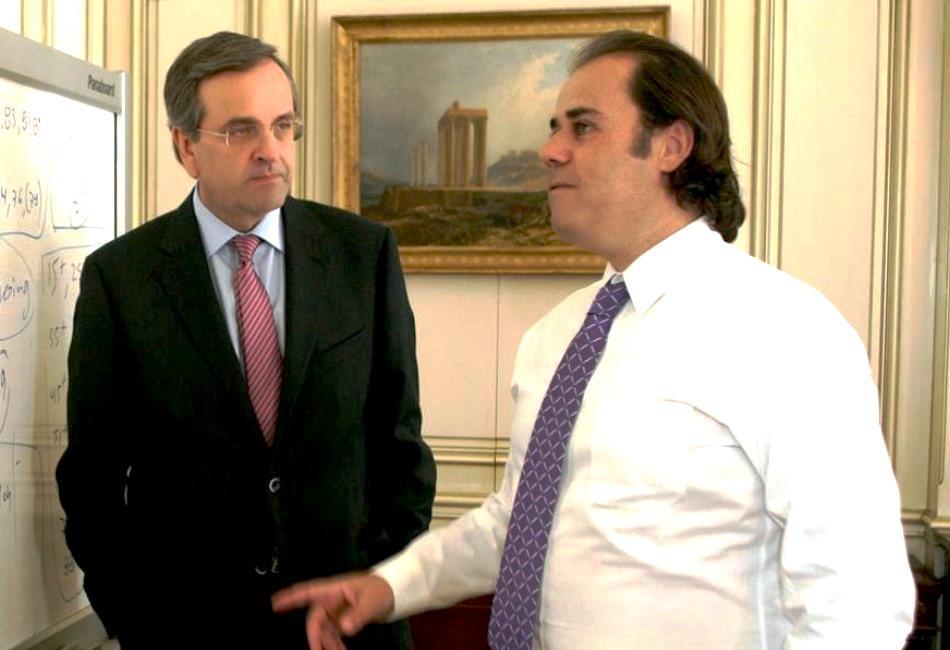By Angelos Al. Athanasopoulos
During six consecutive years, lawyer Stavros Papastavrou was the target of an Orwellian political persecution. The exculpatory decision 2723/2020 by the Athens Misdemeanours Judicial Council, which became irrevocable a few days ago, may well have put an end ito this legal matter, especially concerning his prosecution for a felony; yet the plot woven against Papastavrou in an effort to cast not only the former Prime Minister Andonis Samaras (Papastavrou being his closest aide during negotiations with the ‘Troika’) into the fire, but also other politicians who comprised, according to SYRIZA, “the old regime”, is a dark stain on the political life of post-dictatorship Greece, left by the government of Alexis Tsipras and his coalition partner Panos Kammenos.
Although SYRIZA’s leader had promised a new era, he decided to cooperate with utterly foul and dark elements during his four-year premiership. According to him and his associates, he (Alexis Tsipras) had to exhaust all means, both legal and illegal, in order to frame his opponents, to revive a civil-war environment that would solidify his power, to circumvent the separation of powers in a game without rules, to abuse power and not exercise power.
Engine of the Novartis case
Within that conspiracy scheme, the “Papastavrou case” and the instrumentalisation of the “Lagarde list” served as the engine for more persecutions, such as in the case of Novartis.
There were three preliminary criminal investigations initiated against Papastavrou, involving money laundering, participation in a criminal organisation, and perjury, all three of which were closed without further action, and indeed under the SYRIZA administration.
On top of the aforementioned investigations, there were also the notorious, well-publicised tax fine of three million EUR – eventually refunded – and of course the prosecution for a felony under aggravating circumstances pursuant to Law 1806/1950 on state fund abusers, providing for up to a life sentence. In the meantime, the tax audit on Papastavrou’s property assets was also closed without further action, supported by the positive vote of all judicial officers, in the competent Parliamentary Committee, with 10 votes in favour and one vote against. This one vote was cast by [SYRIZA MP and frontman] Pavlos Polakis.
“The struggle of a citizen against a governmentally rigged persecution is a difficult and strenuous task” Stavros Papastavrou told To Vima newspaper. “In the first place, the institutions of our state proved weak in my case. This should be of concern to us all – citizens, public officials, and the political leadership”. He sees “an extremely pressing need to guarantee and further strengthen the safeguards of the rule of law. There should be a minimum set of rules to be observed by all, including the presumption of innocence and the right to a fair trial”.
The “Minotaur” and the key aspects
In the effort to cross the labyrinth of the Papastavrou case, one risks getting lost after the first steps, however the Minotaur is easy to identify: being former Justice Minister Dimitris Papanghelopoulos, the executive arm of the politically motivated persecution. He casts a heavy shadow over the case.
The summer of 2015 manifestly proved a fateful period. Not only did Greece narrowly avoid the Grexit abyss, after the referendum that almost sent it out of the eurozone and the European Union, but Alternate Justice Minister Dimitris Papangelopoulos also exploited the indolence of the caretaker government in order to orchestrate – not alone, of course – the next moves in the “Papastavrou case”.
The bell did obviously ring earlier, already on 10th of July 2015, during the “hot” week between the referendum and the distressing Brussels summit, where Grexit was thwarted at the last minute. It was on that day that the tax auditors issued their report, containing their findings about Papastavrou and their conclusion that the case should be closed. The report in fact acknowledged what could follow from the official list forwarded by the French Finance Ministry (the “Lagarde list”) – that Stavros Papastavrou was mentioned as “proxy” and not “beneficiary” in a corporate bank account, while there was no evidence of any capital flow or interconnection between the said bank account and his personal bank accounts.
The tax auditor’s doubts and the favourable secondment
There remained, however, a “loose end”, which was by no means accidental. The second tax auditor expressed doubts asking for the completion of the mutual legal assistance sought from abroad and mainly from Cyprus. Thus the case remained open. It cannot probably be seen as a coincidence that, two weeks later, the said tax auditor was seconded to the political office of the then-Deputy Finance Minister Tryfon Alexiadis; another favourable secondment followed soon after. This “legal loophole” (according to those with knowledge of the background of this case) would, down the line in September, 2019, facilitate the circumvention of the rule of law.
The complaint by Filippakis
In mid-summer, just a few days before the caretaker government assumed its duties under premiership of the then-president of the “Areopagus” (Supreme Civil and Criminal Court of Greece) Vasiliki Thanou (designated, a few days after her retirement in 2017, as the – unpaid – Head of Legal Service in the General Secretariat of then-Prime Minister Tsipras, and later appointed President of the Hellenic Competition Commission), Papangelopoulos received on 20 August, 2015 , a complaint by Ioannis Filippakis, pthe ublisher of “Dimokratia” newspaper, more or less accusing Stavros Papastavrou, Sabby Mionis, Angelos Metaxas and the CMA company of participation in a criminal organisation and of money laundering. At that time, Papangelopoulos served as Undersecretary of Justice. Yet a few days later, on 28 August, he would be promoted to Minister of Justice in the temporary pre-election government of Vassiliki Thanou.
The fatal September of 2015
While the country was being stunned by the Rollercoaster of Death type of “heroic negotiations” during the first halfof 2015, nobody could probably notice the hubris committed. The complaint by Filippakis referred to CMA data for 2006, when the company was already part of the listed banking Group EFGI, pertaining to the Latsis family. In effect, that was an indirect complaint against Spyros Latsis as well, since he appeared to have members of an alleged criminal organisation as administrative executives and a lawyer employed and retained in his company!
For his part, Papangelopoulos did not waste time – on this, you can read the extensive report of our newspaper in March, 2018, bearing the title “How Justice was brought under political-judicial control”. He forwarded the case on the same day, not to the Supreme Court Prosecutor’s Office, as he ought to have, nor to the Financial Prosecutors (specifically Panayotis Athanasiou) or the Corruption Prosecutor’s Office (headed at the time by Prosecutor Heleni Raikou), but rather to the Prosecutor’s Office with the Athens First Instance Court, Elias Zagoreos.
The trip to Paris and the interrogation of Falciani
Upon receiving the file on 24 August, Zagoreos assigned the case to Prosecutor Eleni Touloupaki, Christos Ntzouras and Yorgos Kaloudis (the three later reappear in the handling of the Novartis case).
Yet, before the file even reached the three, Filippakis’ newspaper Dimokratia knew it already and published the story on Saturday, 22 August! In the Papastavrou case, the Greek judiciary, known for its delays, suddenly operated at a frantic pace. The notorious trip to Paris, in which the Prosecutors Zagoreos, Touloupaki, Ntzouras and Kaloudis set out to interrogate Hervé Falciani, was scheduled 11 September, 2015 (under the caretaker government), namely a few days before the elections, and indeed without asking for approval from then Supreme Court Prosecutor Efterpi Koutzamani. How this meeting was organised and what was the role of journalist Yanna Papadakou, today employed by the Press Office of the SYRIZA group in the European Parliament, remains a mystery to date.
The illegal list and the SYRIZA campaign ad
That trip was proof of the fact that even a list created to combat tax evasion (2,062 names), which was at first legally introduced into the Greek legal order, and in fact twice, in 2010 and in 2012 (as forwarded by the French Finance Ministry pursuant to the bilateral agreement between Greece and France on tax evasion, upon the request of the then-General Secretary of the Greek Finance Ministry. Elias Plaskovitis), can essentially be tampered with. Besides, Falciani felt at the moment that he was “on a mission”. The new version of the “list” by Falciani – and not of the French Finance Ministry – a list of doubtful authenticity, provided in a USB stick, and bearing no identity feature, which in effect revoked the official list, entered Greece in September, 2015, in a totally illegal manner. This so-called “Falciani list”, where Papastavrou now appeared to be a “beneficiary” and not a “proxy”, will underpin the SYRIZA pre-election ad.
The proposal to testify against Mareva Grabowski
Since anything was permitted, the legalisation of the new version of the list followed its arrival in Greece. That was done through a legislative amendment proposed by Papangelopoulos (who in the meantime had been nominated Alternate Justice Minister), passed on 22 December, 2015, and published in the Government Gazette on 24 December (on Christmas Eve!). Thus, Papastavrou was fined three million euros.
Yet the schemers could not wait. They made use of the amendment before it was enacted, and imposed the fine on… 18 December! Both that fine and the ensuing Odyssey could have been avoided, if Papastavrou had agreed to cooperate in a heinous transaction, giving false testimony against Mareva Grabowski, the wife of Prime Minister Kyriakos Mitsotakis. But these were trivial details for the party calling itself “the first-time Left in power” and certain of its allies in the extreme “national-socialist” wing and the “populist quasi-right” wing.
Concealing the exculpatory document
The salt was rubbed in the wound in May, 2016. Greek judicial authorities received the result of the mutual legal assistance from Cyprus. It was because of that request that the case was left open back in July, 2015. The mutual legal assistance did justice to Papastavrou, however the exculpatory document was kept hidden. “To conceal an exculpatory document for reasons of political gain is deeply undemocratic and conforms to courses of action chosen by authoritarian regimes”, Papastavrou bluntly stated.
The end justifies the means: ‘My guilt was presumed in advance for political reasons’
One gets the impression that the aim – the prosecution of Papastavrou – had been set in advance and everything (and everyone) served this purpose, even if the evidence would not lead to that result. For this reason, the… goalposts were constantly moved.
“Unfortunately, this is accurate,” notes Papastavrou. “In my case it is correct to assume that the presumption of innocence had been revoked and, in fact, a presumption of guilt was created, for obvious reasons of political gain. My guilt was presumed in advance for political reasons,” he added.
According to Papastavrou, his case presents “two different approaches as to the political process in our country».
«The first one is that of liberal democracy, whose linchpin is that justice as the linchpin of democracy. Yet, there is also the Marxist-Leninist approach, which assumes that the essence of politics is a war fought between enemies and friends, and that the latter must by all means prevail over the former. To defeat the enemy in the battlefield, one uses all means, whether legal or illegal, and any institutional safeguards set by the rule of law are devalued as mere formalities,” Papastavrou said.
«Any parliamentary majority, regardless of how powerful, should not lead to disregarding the presumption of innocence. In a liberal democracy, the individual rights of citizens are inviolable and must be protected,” he said, citing the late Professor of Constitutional Law Stavros Tsakyrakis, whom he met at Harvard Law School between 1993 and 1994.



